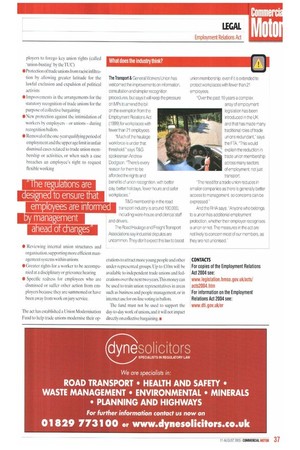Protedion packet
Page 36

Page 37

If you've noticed an error in this article please click here to report it so we can fix it.
Striking workers have been granted protection but employers are entitled to more information about stoppages... Emma Page reports on recent changes to employment law.
The Employment Relations Act 2004 puts into law the conclusions of the government's review of the 1999 Employment RelationsAct and paved the way for the implementation of the Information and Consultation of Employees Regulations 2004.1t was brought into force in stages up to April 2005.
The act tidies up various anomalies, including the protection of workers on jury service which, bizarrely, had been overlooked in previous legislation.
It also incorporates a significant union victory: extending automatic protection against unfair dismissal for employees taking official industrial action from eight weeks to 12. Any days when employees are locked out by their employers are excluded from the 12-week calculation and will be deemed to extend the period of protection against dismissal.
However, this extension has come at a price: the regulations require more precise information from unions when action is planned to ensure their members are legally protected during a strike.
Any ballot notice to an employer must list the categories of employees and their workplaces, as well as the total number involved, the number within each category of employee and the number within each workplace. Local reps will have to keep their lists bang up to date and pass this information onto union officials to avoid delaying the process.
Economic consultation
Paving the way for the implementation of the Information and Consultation Directive, the act gives employees the right to be briefed and consulted about their employer's activities and economic situation. Organisations with 150 or more employees came within the scope of the legislation on 6 April 2005; those with 100 or more will be included in April 2007; and those with 50 or more in April 2008.
But the requirements in the legislation do not apply automatically. Employers can initiate the process themselves, or an employee request may be made by at least 10% of the workforce (subject to a minimum of 15 employees and a maximum of 2,500).
The regulations are designed to ensure that employees are informed and consulted by management ahead of likely changes within their company's organisation, either for business reasons or due to the economic outlook. This includes any potential threat to jobs.
The European Union's intention is for employees to have meaningful influence over such decisions. Only companies with over 50 employees will be covered; these rights will be phased in depending on the number of employees.
Other significant changes brought in by the Employment Relations Act 2004 include: • Strengthening the rights of trade union members by giving them the right to use union services and protecting employees against underhand inducements from em ployers to forego key union rights (called 'union-busting by the Ti IC) • Protection of trade unions from racist infiltration by allowing greater latitude for the lawful exclusion and expulsion of political activists • Improvements in the arrangements for the statutory recognition of trade unions for the purpose of collective bargaining • New protection against the intimidation of workers by employers or unions during recognition ballots • Removal of the one-year qualifying period of employment and the upper age limit in unfair dismissal cases related to trade union membership or activities, or when such a case breaches an employee's right to request flexible working • Reviewing internal union structures and organisation, supporting more efficient management systems within unions • Greater rights for a worker to be accompanied at a disciplinary or grievance hearing • Specific redress for employees who are dismissed or suffer other action from employers because they are summoned or have been away from work on jury service.
The act has established a Union Modernisation Fund to help trade unions modernise their op erations to attract more young people and other under-represented groups. Up to El Om will be available to independent trade unions and federations over the next two years:This money can be used to train union representatives in areas such as business and people management, or in internet use for on-line voting in ballots.
The fund must not be used to support the day-to-day work of unions, and it will not impact directiv on collective bargaining. •


































































































































































































